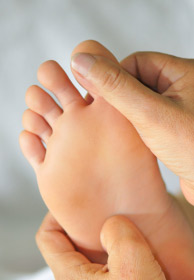Reflexology FAQ
Is Reflexology new?
Although recently becoming much more popular and accepted in Western society, reflexology has been practiced for thousands of years by Egyptians, Native American cultures and Mayan and Incan civilizations. It is widely accepted in many European countries as a complimentary therapy. Modern reflexology has its origins in the late 1930’s, thanks to its founder Eunice Ingham.
Is Reflexology the same as Massage, Acupuncture, or Acupressure?
Reflexology is not the same as massage, which involves tissue and muscle therapy to promote relaxation. Acupuncture, Acupressure and Shiatsu are similar in some respects to reflexology in their use of reflexes or meridians that relate to the glands, organs and parts of the body. However reflexology focuses on relaxation of those reflexes through manipulation to reduce stress and tension. Reflexology is administered by using thumb and finger pressure to specific points on the feet.
What may I experience during a reflexology session?
The session begins with a thorough cleansing of the feet using a natural hydrosol which has anti fungal, anti bacterial properties, leaving the feet feeling soothed and refreshed. This is followed by a short foot massage which serves to relax the foot and to give the therapist an opportunity to become familiar with the feet, and to make observations regarding their condition. After this the specific and precise Reflexology treatment will begin.
What are the benefits of Reflexology?
Reflexology primarily eases and releases mental and physical stress and tension, which in turn can improve blood circulation, encourage lymphatic drainage, assist in the elimination of toxins, stimulate nerve pathways, relax muscles and strengthen the immune system. It enables the body’s natural healing processes to promote wellness.
Can Reflexology make a condition worse?
No. Reflexology is a non-invasive natural therapy that relaxes the body and is essentially harmless. On rare occasions, release of toxins as a result of the body’s natural healing process may result in symptoms such as perspiration, nausea or headaches. However these symptoms are not directly related to reflexology, and are temporary and not serious.
Who can benefit from Reflexology sessions?
Everyone can benefit from Reflexology treatments. You do not have to have an illness to have Reflexology. Clients who want to alleviate stress can benefit from Reflexology. All ages can benefit from Reflexology, including infants and children. We have clients as young as three months old to people in their 90’s seeking our services.
Aftercare Advice?
To make the most of a Reflexology session it is advisable to avoid strenuous activities for 24 hours. This allows the body to integrate the benefits of the treatment while encouraging and prolonging the rest and relax mode which the body was adjusted to during the treatment itself. Drink plenty of water to aid detoxification and the flushing of toxins from the system.
